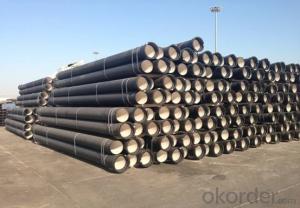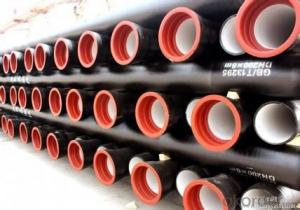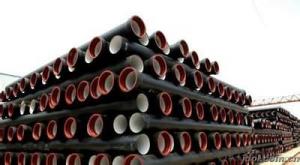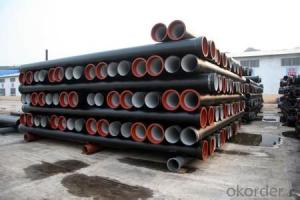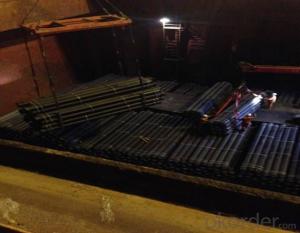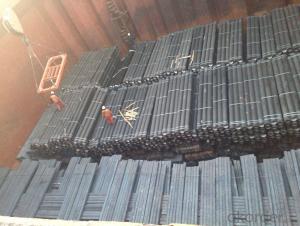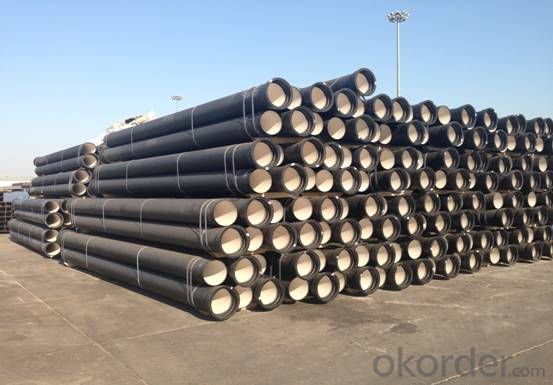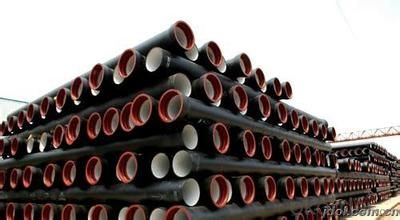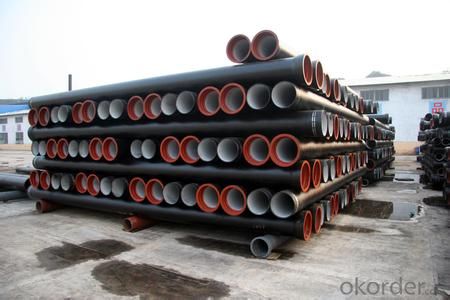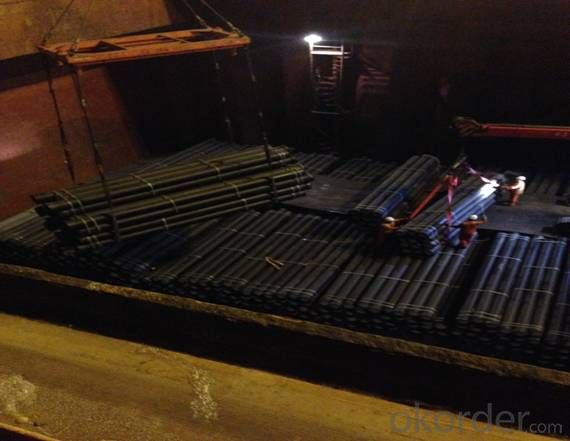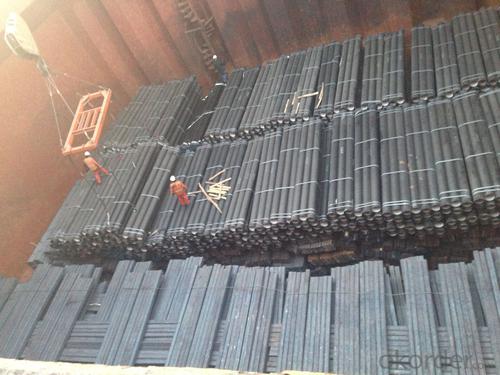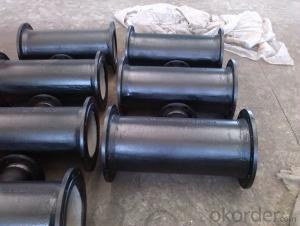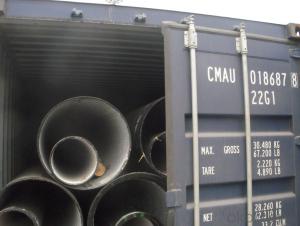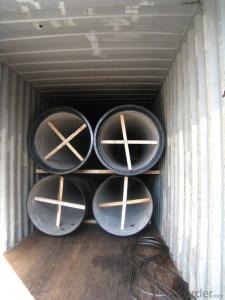DUCTILE IRON PIPE C Class DN1600
- Loading Port:
- China Main Port
- Payment Terms:
- TT OR LC
- Min Order Qty:
- -
- Supply Capability:
- -
OKorder Service Pledge
OKorder Financial Service
You Might Also Like
Ductile Iron Cast Pipe is without any defects compare with tradition casting tech, which has many advantages particularly as follow:
(1) High density. In the "vertical upward casting" process, the melt iron of centre liquid column in center crystallizer is continuously feeding for volume shrinkage caused by condensation tube at outer circumference , which lead to be free of shrinkage porosity.
(2) High purity. When melt iron pouring, the mixed impurities such as gas, dross, sand grain which are lighter than melt iron could be eliminated at furnace mouth, its impossible to enter into the crystallizer through the channel, so the melt iron into the crystallizer is very pure.
(3) Strength with toughness. The cooling speed provided by continuous crystallizer is 30 times than sand casting and 5 times than centrifugal casting, and doesn't produce white iron, the eutectic cell volume of continuous cast iron is one eighth to one tenth compare with traditional cast iron. The density of graphite nodule in ductile iron can reach 300-700 pcs/mm2. Therefore, all reason above improve the strength and toughness of continuous cast iron.
(4) Free machining. The high speed cooling make the hardening phase (such as boride, steadite) not appear like reticular, massive or thick, but diffuse like fish bone and pane in shape, moreover, there are tiny graphite flakes inlaid hardening phase. It's free machining in BrinellHardness the range of 250-300HB. However, the Brinell Hardness of 250 is top limit to common metal materials.
(5) Uniform composition of tube wall. The convection mixing of liquid column caused by marching type drawing in crystallizer make the composition of tube wall well-distributed, and concentration gradient very little.
(6) High productivity. To the wall thickness of tube under 10mm, the speed of continuous casting is 1 meter/min, to the wall thickness of tube under 20mm, the speed of continuous casting is 0.5 meter/min, which is high efficiency that centrifugal or other casting tech couldn't reach.
- Q: How do ductile iron pipes handle traffic vibrations?
- Ductile iron pipes are known for their exceptional strength and durability, making them highly capable of handling traffic vibrations. The inherent properties of ductile iron make it more resistant to fractures or cracks caused by external forces, including vibrations induced by traffic. The material's high tensile strength and elasticity allow ductile iron pipes to absorb and dissipate the energy generated by traffic vibrations. This helps to minimize the impact on the pipes and prevent any significant damage or failure. Additionally, the ductility of the material allows it to deform slightly under stress without breaking, further enhancing its ability to withstand vibrations. Furthermore, ductile iron pipes have superior resistance to corrosion and other forms of deterioration. This resistance ensures that the pipes maintain their structural integrity over an extended period, even when subjected to repetitive vibrations caused by heavy traffic. Overall, ductile iron pipes are well-equipped to handle traffic vibrations due to their robust nature, ability to absorb energy, and resistance to corrosion. These features make them a reliable choice for underground infrastructure in areas with high traffic volumes, ensuring a long-lasting and efficient pipeline system.
- Q: What is the expected joint deflection capability of ductile iron pipes?
- The expected joint deflection capability of ductile iron pipes is typically around 2 to 5 degrees per joint, allowing for flexibility and accommodating slight changes in alignment during installation and operation.
- Q: Can ductile iron pipe be used for fire protection systems?
- Yes, ductile iron pipe can be used for fire protection systems. Ductile iron pipe has excellent resistance to fire, making it a suitable choice for fire protection applications. It is known for its strength, durability, and ability to withstand high temperatures, making it reliable for transporting water or other fire suppression agents.
- Q: Is nodular cast iron pipe filled with Yau Ma Tei?
- Ductile iron pipes are defined as pipes made by casting more than 18 of casting molten iron by adding a spheroidal agent and then centrifugally centrifugally cast by a centrifugal nodular cast iron machineDuctile iron pipe ([span]Ductile Cast Iron Pipes), referred to as ball pipe, ductile iron pipe and ductile iron pipe etc..
- Q: What are the different pressure ratings available for ductile iron pipe?
- The pressure ratings available for ductile iron pipe typically range from 150 psi to 350 psi, depending on the size and application of the pipe.
- Q: Are ductile iron pipes suitable for gravity flow applications?
- Yes, ductile iron pipes are suitable for gravity flow applications. Ductile iron pipes have high strength and durability, making them ideal for carrying fluids under gravity. They can withstand the pressure and weight of fluid flow without the need for additional support or reinforcement. Additionally, ductile iron pipes have excellent corrosion resistance, which ensures their long-term performance in gravity flow systems.
- Q: Are ductile iron pipes resistant to biological growth?
- Indeed, ductile iron pipes exhibit a general resistance to biological growth. Ductile iron, a robust and enduring substance, finds widespread application in water and sewage systems. Its sleek exterior hampers the proliferation of bacteria, fungi, and other microorganisms that foster biological growth. Moreover, ductile iron pipes frequently receive protective linings or coatings, for instance, cement mortar or epoxy, which heighten their resistance to biological growth. Nevertheless, it is crucial to acknowledge that no material remains entirely impervious to biological growth, necessitating regular maintenance and cleansing of the pipes to ensure sustained resilience in the long run.
- Q: How can the cast iron pipe be connected?
- Depends on what type of, A type with flange connection, W type stainless steel band clamp connection
- Q: What is the weight of ductile iron pipe compared to other pipe materials?
- Ductile iron pipe is generally heavier compared to other pipe materials. Its weight can vary depending on the size and thickness of the pipe, but generally, ductile iron pipe is denser and has a higher weight per unit length compared to materials like PVC, HDPE, or steel. This higher weight of ductile iron pipe is primarily due to its composition, which includes iron and carbon, making it a sturdy and durable option for various piping applications.
- Q: How do ductile iron pipes handle ground movement due to tree roots?
- Ductile iron pipes have excellent resistance to ground movement caused by tree roots. The material's high strength and flexibility allow it to withstand root penetration and continue to function effectively. Additionally, the joints in ductile iron pipes are designed to accommodate some degree of movement, further minimizing the impact of tree roots on the pipe's integrity.
Send your message to us
DUCTILE IRON PIPE C Class DN1600
- Loading Port:
- China Main Port
- Payment Terms:
- TT OR LC
- Min Order Qty:
- -
- Supply Capability:
- -
OKorder Service Pledge
OKorder Financial Service
Similar products
Hot products
Hot Searches
Related keywords
